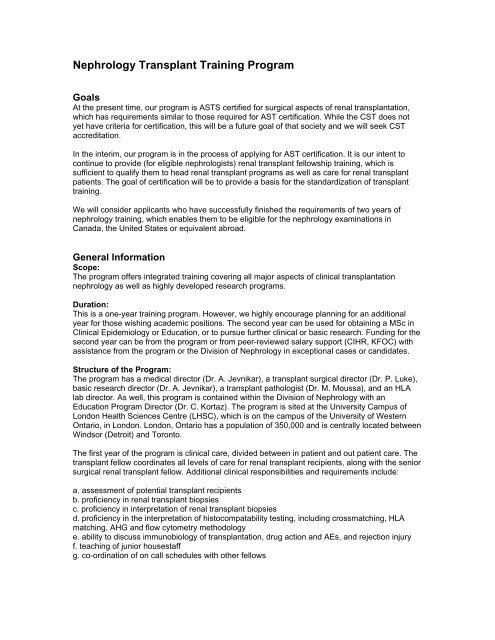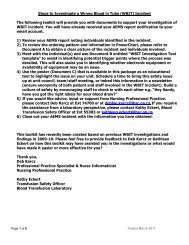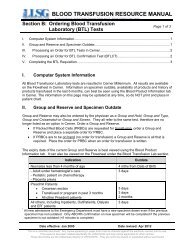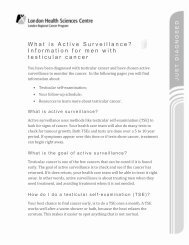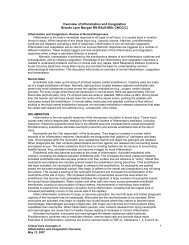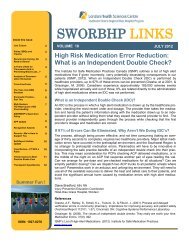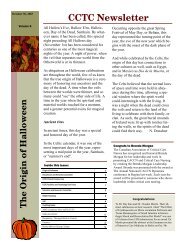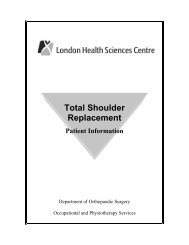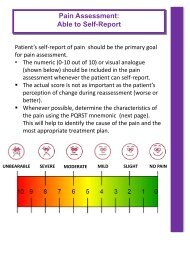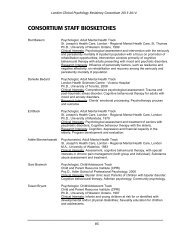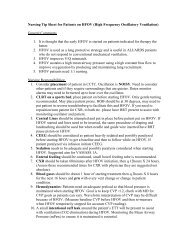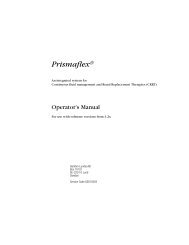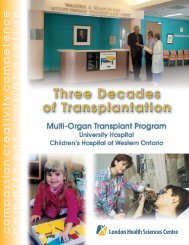Our Training Program - London Health Sciences Centre
Our Training Program - London Health Sciences Centre
Our Training Program - London Health Sciences Centre
Create successful ePaper yourself
Turn your PDF publications into a flip-book with our unique Google optimized e-Paper software.
Nephrology Transplant <strong>Training</strong> <strong>Program</strong><br />
Goals<br />
At the present time, our program is ASTS certified for surgical aspects of renal transplantation,<br />
which has requirements similar to those required for AST certification. While the CST does not<br />
yet have criteria for certification, this will be a future goal of that society and we will seek CST<br />
accreditation.<br />
In the interim, our program is in the process of applying for AST certification. It is our intent to<br />
continue to provide (for eligible nephrologists) renal transplant fellowship training, which is<br />
sufficient to qualify them to head renal transplant programs as well as care for renal transplant<br />
patients. The goal of certification will be to provide a basis for the standardization of transplant<br />
training.<br />
We will consider applicants who have successfully finished the requirements of two years of<br />
nephrology training, which enables them to be eligible for the nephrology examinations in<br />
Canada, the United States or equivalent abroad.<br />
General Information<br />
Scope:<br />
The program offers integrated training covering all major aspects of clinical transplantation<br />
nephrology as well as highly developed research programs.<br />
Duration:<br />
This is a one-year training program. However, we highly encourage planning for an additional<br />
year for those wishing academic positions. The second year can be used for obtaining a MSc in<br />
Clinical Epidemiology or Education, or to pursue further clinical or basic research. Funding for the<br />
second year can be from the program or from peer-reviewed salary support (CIHR, KFOC) with<br />
assistance from the program or the Division of Nephrology in exceptional cases or candidates.<br />
Structure of the <strong>Program</strong>:<br />
The program has a medical director (Dr. A. Jevnikar), a transplant surgical director (Dr. P. Luke),<br />
basic research director (Dr. A. Jevnikar), a transplant pathologist (Dr. M. Moussa), and an HLA<br />
lab director. As well, this program is contained within the Division of Nephrology with an<br />
Education <strong>Program</strong> Director (Dr. C. Kortaz). The program is sited at the University Campus of<br />
<strong>London</strong> <strong>Health</strong> <strong>Sciences</strong> <strong>Centre</strong> (LHSC), which is on the campus of the University of Western<br />
Ontario, in <strong>London</strong>. <strong>London</strong>, Ontario has a population of 350,000 and is centrally located between<br />
Windsor (Detroit) and Toronto.<br />
The first year of the program is clinical care, divided between in patient and out patient care. The<br />
transplant fellow coordinates all levels of care for renal transplant recipients, along with the senior<br />
surgical renal transplant fellow. Additional clinical responsibilities and requirements include:<br />
a. assessment of potential transplant recipients<br />
b. proficiency in renal transplant biopsies<br />
c. proficiency in interpretation of renal transplant biopsies<br />
d. proficiency in the interpretation of histocompatability testing, including crossmatching, HLA<br />
matching, AHG and flow cytometry methodology<br />
e. ability to discuss immunobiology of transplantation, drug action and AEs, and rejection injury<br />
f. teaching of junior housestaff<br />
g. co-ordination of on call schedules with other fellows
Research Opportunities:<br />
During the program, the fellow will be expected to carry out a research project. This may be<br />
clinical or may be laboratory based. This will be organized with the director but may be in with any<br />
member of the transplant team. Travel bursaries are available for fellows to attend one national<br />
(CST) and one intermational (ATC) meeting. A “pre-AST” meeting is held annually to provide a<br />
forum for practice talks and presentations.<br />
Organized Teaching<br />
A full complement of rounds, conferences, visiting professors days and seminar sessions is<br />
directed specifically to Transplant Fellows. Fellows may also participate in corresponding<br />
conferences and seminars available for General Internal Medicine and other subspecialties, if<br />
time permits. There is monthly journal club meeting, organized by fellows and attended by faculty<br />
and house-staff. There are didactic teaching sessions which cover the spectrum of<br />
transplantation. Additionally, elective times are encouraged and arranged for the following:<br />
1. Transplantation infectious diseases - one month with Dr. Atul Humar in Toronto<br />
2. Histocompatibility - one month with Dr. Peter Nickerson in Winnipeg. This will also contain<br />
some pathology assessment of surveillance biopsies at 1 to 6 months, as our program does not<br />
routinely do these.<br />
Evaluation<br />
The following are the criteria by which certification for Fellows is granted from AST-accredited<br />
programs. Please note that almost all of these are currently in place at LHSC.<br />
Criteria changes effective August 3, 2004<br />
1) The transplant program must be UNOS approved as a Renal Transplant <strong>Program</strong>, and be<br />
affiliated with an ACGME-approved nephrology program. Transplant programs that are not UNOS<br />
approved and/or affiliated with an ACGME approved nephrology program will be evaluated by the<br />
AST/ASN Renal Fellowship <strong>Training</strong> Accreditation <strong>Program</strong> Committee on a case-by-case basis.<br />
2) The transplant program must perform at least 10 renal transplants per year for each first year,<br />
general nephrology fellow in training and an additional 30 transplants per year for each renal<br />
transplant fellow to be trained. The minimum number of transplant biopsies to be performed by<br />
the fellow during the fellowship year is 10. This criterion ensures that the renal transplant<br />
fellowship program will not encroach upon the RRC-IM requirement that all nephrology trainees<br />
must manage 10 new transplant recipients.<br />
3) The program must have a full-time faculty member or members capable of teaching a<br />
curriculum with a broad base of knowledge in transplant medicine. The curriculum designed by<br />
the RENAL transplant FELLOWSHIP program director needs to include training and experience<br />
in end-stage renal disease, training in the selection of appropriate transplant recipients and<br />
donors, experience in the immediate and long term care of the transplant recipient, and training in<br />
the performance of renal transplant biopsies. Additionally there must be an emphasis on the<br />
management of immunosuppressive agents and the evaluation of renal transplant dysfunction.<br />
Combined surgical and medical rounds should be conducted on a regular basis. It is strongly<br />
recommended that the didactic section of the program follow the AST's Primer on<br />
Transplantation.<br />
4) The program must provide patient co-management responsibility with transplant surgeons from<br />
the peri-operative through the outpatient period. The renal trainee must primarily manage the<br />
transplant recipient's medical care including hypertension, diabetes, and dialytic problems.<br />
Trainees must also serve as a primary member of the transplant team and participate in making<br />
decisions about immunosuppression. The transplant renal fellow must be primarily responsible for<br />
30 in-patient renal transplant recipients and 30 outpatient recipients over a period of 12 months.<br />
Outpatient follow-up must be continuous for a minimum of at least three months. <strong>Training</strong> must be
completed within 12 continuous months; a minimum of six months of training must be performed<br />
in inpatient clinical service and the remaining months should be selected to gain experience in<br />
tissue typing, experience on another organ transplant service or clinical or basic research projects<br />
associated with transplantation.<br />
5) The program is to provide training in: a) the indications for, b) the performance of, and c)<br />
interpretation of, renal transplant biopsies. The transplant fellow must perform a minimum of 30<br />
transplant biopsies during the training period. Documentation of the completion of these biopsies<br />
is required. Furthermore the program must provide didactic pathological experience with the<br />
trainee reviewing renal transplant biopsies with an experienced renal transplant pathologist.<br />
6) The renal transplant fellow must observe at least three renal transplants (deceased donor and<br />
living related or living unrelated) and also must observe at least three procurement procedures.<br />
7) The renal transplant fellowship program director must provide a letter to the fellow within two<br />
months of successful fellowship completion, stating that the trainee has met all of the above<br />
criteria and is capable of being certified as a UNOS transplant physician. A copy of this letter<br />
along with a written statement validating the transplant fellow's participation in the required<br />
didactic sessions and patient management experiences must be sent to the AST National Office<br />
for the program file and a copy of the letter should be given to the fellows. Documentation that the<br />
renal transplant fellow has performed the prerequisite number of 30 in-patient and 30 outpatient<br />
recipient encounters; 3 surgical observations, 3 procurement OBSERVATIONS and 30 renal<br />
transplant biopsies must be kept by the fellow. Documentation should, at a minimum, be in the<br />
form of a log that contains the date of patient contact, type of examination, type of procedure<br />
performed or observed and the signature of the transplant physician present. The fellow will be<br />
required to complete an evaluation form at six months into the program and at the completion of<br />
the 12-month fellowship. Each training program director will be responsible to ensure that the<br />
fellow receives and completes the forms. The forms should be sent to the AST National Office.<br />
Upon receipt, the committee will review the forms and a copy will be provided to the Transplant<br />
<strong>Training</strong> <strong>Program</strong> Director. These forms will help maintain a consistency of the education mission<br />
of the program.<br />
In addition, the fellow at the successful completion of required training shall be competent to<br />
provide comprehensive, specialized medical care based on a high standard of demonstrated<br />
component skills. These skills should clearly exceed those demonstrated by the certified<br />
nephrologist as transplant care is additional to general nephrology.<br />
Specifically, by the completion of the training program, the candidate will have had an opportunity<br />
to demonstrate the following:<br />
i) Clinical Judgment<br />
This is the process by which clinical decisions are made. Good clinical judgment encompasses:<br />
(a) integrating medical facts and clinical data,<br />
(b) weighing alternatives,<br />
(c) understanding the limitations of knowledge,<br />
(d) recognizing complications of disease and side effects of treatment,<br />
(e) instituting prompt measures to deal with serious or life-threatening clinical manifestations,<br />
(f) incorporating the consideration of risks and benefits to the patient, and<br />
(g) developing a logical plan for evaluation of both immediate and long-term management of the<br />
renal transplant patient.<br />
ii) Medical Knowledge<br />
This is defined as specialized, currently accepted, and up-to-date knowledge and information that<br />
is required to function as an expert clinical transplant nephrologist. This includes a broad<br />
knowledge of the pathogenesis, natural history and management of kidney transplants; renal<br />
physiology; disorders of fluid, electrolyte and acid-base regulation; normal and disordered mineral
metabolism; chronic renal failure; the management of patients receiving immunosuppressive<br />
therapy; and the management and diagnosis of hypertension. The clinical nephrologist also must<br />
be proficient in the principles and applications of various forms of renal replacement therapy,<br />
including hemodialysis and when to apply to the failing transplant.<br />
iii) Clinical Skills<br />
These include:<br />
a) obtaining appropriately directed medical histories which are precise, logical, thorough,<br />
and reliable,<br />
b) conducting expert, focused physical examinations that elicit subtle findings and are<br />
directed toward the patient's problems,<br />
c) demonstrating understanding and proficiency while minimizing risk and discomfort to the<br />
patients in the performance of certain diagnostic and therapeutic procedures.<br />
(See above for requirements).<br />
iv) Humanistic Qualities<br />
These are integrity, respect, and compassion as demonstrated in the care of patients and their<br />
families. They include the abilities to be honest, involved, and responsive to the patient's wishes;<br />
to respect the patient's need for information; to establish the patient's trust; to provide empathy;<br />
and to maintain credibility and rapport with patients and their families.<br />
v) Professional Attitudes and Behaviour<br />
Those attitudes, behaviour, and interpersonal skills, defined as essential in relating to patients<br />
and educating them, their families, and other health care professionals include the ability and<br />
willingness to describe the diagnosis and likely clinical course to the patient and the family; to<br />
explain therapeutic options (including benefits and side effects); to accept responsibility; to write<br />
comprehensive consultation notes in medical records and letters to referring physicians, patients,<br />
and appropriate agencies; and to be available to other physicians when needed. Skills and<br />
experience in both self-assessment and peer-review of quality of care also are critical.<br />
vi) Medical Care<br />
The outcome of the integration of the foregoing component skills is the ability to management<br />
patients. Excellent medical care results from the consistent ability to apply appropriate,<br />
comprehensive care of high quality; to be responsive to the patient's needs; to use laboratory<br />
tests, consultations, and diagnostic and therapeutic procedures efficiently, effectively, and in the<br />
patient's best interest; and to assure patient advocacy for optimal use of limited resources to<br />
maintain or enhance quality of care.<br />
vii) Continuing Scholarship<br />
The encompasses the commitment to maintain and update clinical skills throughout the<br />
physician's professional career; to acquire new knowledge through computer access, by reading<br />
the current medical literature and participating in scientific or clinical studies, related research,<br />
and/or scientific or clinical meetings for nephrologists, and to evaluate critically the new medical<br />
and scientific information relevant to the subspecialty.<br />
viii) Moral and Ethical Behaviour<br />
This implies the consistent demonstration of a high standard of moral and ethical behaviour within<br />
the clinical setting and of the medial profession. In conjunction with this philosophy and<br />
expectation, the program considers it unethical for a physician to refuse to treat a patient solely<br />
on the basis of that patient's disease, when that disease is within the physician's area of<br />
competence.
Feedback<br />
Every attempt will be made by all teaching faculty to provide prompt, verbal, constructive<br />
feedback to trainees throughout the training program. The director will meet with each fellow at<br />
least monthly to provide more formal formative feedback. Every trainee will meet with the<br />
Education Director to discuss their performance.<br />
The <strong>Program</strong> Director maintains a file on each trainee to document evaluation of his or her clinical<br />
competence, performance, and progress in the training program. This file will be in addition to the<br />
log kept by each fellow that documents all procedures.<br />
Appeals of Adverse Evaluations<br />
The <strong>Program</strong> is committed to providing trainees with due process. Any trainee wishing to appeal<br />
an adverse judgment must first appeal to the local hospital program chief. Failure to achieve<br />
satisfaction at this level should lead to an appeal to the UWO Nephrology <strong>Program</strong> Director. The<br />
next level of appeal should be to the UWO Nephrology Education Committee. Failures at these<br />
levels will then allow an appeal to the Faculty Appeals Committee. The final level of appeal is to<br />
the UWO Senate Review Board Academic.


